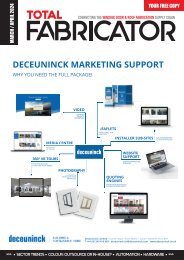March 2018
You also want an ePaper? Increase the reach of your titles
YUMPU automatically turns print PDFs into web optimized ePapers that Google loves.
Fragile Roofs<br />
THE COST AND CONSEQUENCES<br />
OF FRAGILE ROOF FALLS<br />
A staggering number of falls from height continue to be linked with fragile roofs. Employers<br />
are faced with harsh fines and court appearances due to unsafe working conditions and not<br />
following the correct procedures for employees to remain safe. Soni Sheimer, General<br />
Manager at Easi-Dec, takes a look at the range of options and solutions that are available to<br />
contractors working at height.<br />
According to the Health and Safety<br />
Executive (HSE), falls from height remain<br />
one of the most common causes of fatality<br />
and major injury in the UK, with falls through<br />
fragile surfaces accounting for 22% of all<br />
accidents from height in the construction<br />
industry. The 2016/2017 provisional figures<br />
report that there were 25 fatalities as a result of<br />
falls from height at work.<br />
The key piece of legislation is the Work at Height<br />
Regulations 2005, as amended by the Work at<br />
Height (Amendment) Regulations 2007, which<br />
places a legal requirement for anyone who<br />
contracts others to access and maintain rooftop<br />
equipment on public buildings and housing<br />
developments to ensure proper safety precautions<br />
are in place. Breaching these regulations can<br />
result in a legal prosecution and either a<br />
substantial fine or possible imprisonment.<br />
In November 2017, a Dudley-based contractor<br />
was fined and sentenced to 180 hours community<br />
service and given a six-month prison sentence<br />
suspended for 12 months after a 30-year old<br />
labourer fell more than six metres through a<br />
fragile roof. The man suffered numerous fractures<br />
to his spine, pelvis and shoulder, and will now<br />
never work as a roofer again. The HSE<br />
investigation found that the contractor failed to<br />
address the risk of working at height and on<br />
fragile surfaces before undertaking this roofing<br />
work. He also failed to ensure that fellow workers<br />
had the adequate support to complete this work<br />
and this resulted in it being carried out in an<br />
unsafe manner.<br />
Solutions for fragile roof work<br />
Access to roof tops requires<br />
solutions that are designed to<br />
overcome the challenges of<br />
working on fragile roofs and<br />
provide the user with a safe<br />
working position for skin<br />
maintenance, inspection, cleaning and<br />
re-sealing work.<br />
It is essential that all work at<br />
height is properly planned and<br />
carried out by competent<br />
members of staff.<br />
Selecting the right equipment is<br />
key to reducing the risk of accidents<br />
and falls from height. It needs to be<br />
secure, easy to access and meet<br />
required regulations. Any of<br />
these three types of access<br />
systems can be considered<br />
when accessing roof tops:<br />
1. Mesh walkways are a great<br />
option when access is needed to<br />
run from the eaves to ridge. It provides<br />
the benefit of spreading the weight across the<br />
support battens, allowing the contractors to<br />
confidently move along the full length of the<br />
system. Opting for a solution that is made from<br />
high grade aluminium ensures the structure is<br />
robust, lightweight, and easily transportable.<br />
2. A fully guarded rolling platform, which is<br />
mounted on twin racks, allows contractors to<br />
move up and down the roof on a secure and level<br />
surface. Requiring no penetration,<br />
the structure is easy to<br />
assemble and take down, and<br />
is possible to transport quickly<br />
to other parts of the roof. The<br />
platform moves along a linking<br />
track which is fitted with safety<br />
mesh and battens to provide further<br />
support.<br />
3. Lightweight mobile walking<br />
frames are designed to<br />
provide safe access for one or<br />
two people when working<br />
along valley gutters. The<br />
outriggers are filled with safety<br />
mesh and cushioned for comfort. This<br />
system can also be used to transport<br />
light payloads. Suitable for typical<br />
symmetrical valleys, the system<br />
could also be fully adjustable<br />
to suit uneven designs.<br />
Working with these types of<br />
systems presents roofing<br />
contractors with a quicker, more<br />
cost-effective and more practical<br />
approach to rooftop access, and will ensure that<br />
they comply fully with the requirements of the<br />
Work at Height Regulations.<br />
Images, top to bottom: Board-Walk Mesh Walkway; Roof-<br />
Walk rolling work platform; Valley-Walk mobile walking frame<br />
Contact Easi-Dec<br />
01767 691812<br />
www.easi-dec.co.uk<br />
@EasiDec<br />
42 TC MARCH <strong>2018</strong>

















